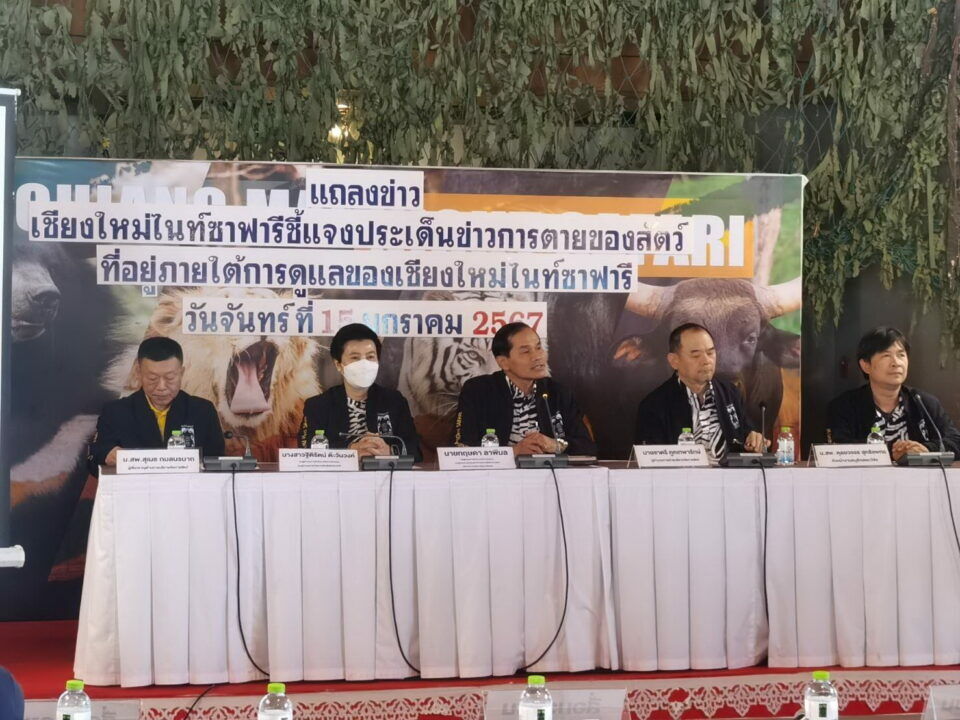Update: Chiang Mai Night Safari confirms four zoo animals died, not 13

Kritsada Lapimon, Deputy Director of the Pinkanakorn Office and Director of the Central Administration Office performing duties on behalf of the Director of the Pinkanakorn Development Office, chaired a press conference to clarify the number of deaths of animals at the Chiang Mai Night Safari yesterday, January 15.
Thitirat Tawanwong, Deputy Director of the Pinkanakorn Development Office and Director of Chiang Mai Night Safari along with animal expert Dr Sumet Kamonranat, Chatri Khuhatheparak, Director of Animal Management, and Dr Tulyawat Suthiphaet, supervisor at Conservation and Research were present at the press conference at Vareekunchorn Building, Chiang Mai Night Safari Office.
Kritsada stated that the number of animals found dead at the Chiang Mai Night Safari as reported previously was erroneous. Pinkanakorn Development Office has checked and confirmed the details and facts.
From the investigation of animal deaths in December last year, the Chiang Mai Night Safari Office confirms that four animals died, a red-shanked douc, a Vulpini, a fennec fox and a leopard cat. The number that had been previously reported, 13, is false, reported Daily News.
Established in 2005, the Chiang Mai Night Safari Office serves as an agency responsible for showcasing a diverse array of animals. Originally, the early exhibits featured a range of species that have now aged gracefully.
The office diligently tends to the elderly animals, ensuring they thrive until the conclusion of their natural lifespan. Natural occurrences, inherent to zoos, prompt the need for a committee to investigate any fatalities, with findings promptly reported to the Pinkanakorn Development Executive Committee.
The office adheres to strict standards, aligning with animal welfare principles advocated by WAZA (World Association of Zoo and Aquariums) and SEAZA (South East Asian Zoo Association).
ORIGINAL STORY: Mysterious mass death at Chiang Mai Night Safari shocks Thailand
Chiang Mai Night Safari, a popular tourist attraction in Thailand, faced a mysterious mass death of 13 endangered animals, a significant blow to the country’s wildlife. The casualties include a valuable white tiger, with veterinarians attributing the deaths to various causes, including natural ageing and diseases.
Visitors to the Chiang Mai Night Safari expressed disappointment, reporting that the number of rare and expensive animals was significantly reduced. They lamented that the entrance fee did not justify the experience, considering the scarcity of unique wildlife.
The management of Chiang Mai Night Safari and the Office of Natural Resources and Environment, the supervising authority, convened a meeting to discuss the alarming situation. The veterinary team reported that in December last year, 13 animals, including a large white tiger, had died.
They attributed the tiger’s death to ageing and stated that another white tiger cub had died earlier, at less than ten months due to weak health and infection. Several other animals had also died or disappeared, allegedly due to predation by pythons, preventing the recovery of their remains.
This situation prompted a call for the prime minister and responsible ministers to investigate the matter urgently. If left unresolved, the dwindling wildlife population could tarnish the reputation of Chiang Mai Night Safari, renowned as one of the world’s top tourist attractions. The Safari currently attracts no less than 2,000 visitors each day.
On January 9, the Office of Natural Resources and Environment and the Chiang Mai Night Safari launched a project to conserve important and endangered wildlife species. Thitirat Tawanwong, Director of Chiang Mai Night Safari, revealed that various wildlife species in Thailand are experiencing a continuous decline in numbers.
In cooperation with the Faculty of Veterinary Science, Khon Kaen University, the safari initiated a project to extract and freeze the semen of endangered wildlife, including the Malayan Tapir and the Malayan Sun Bear. This will allow for the assessment of semen quality and its use in future artificial insemination programmes, reported KhaoSod.
In addition to these two species, the Chiang Mai Night Safari has collected semen from several other wildlife species, both foreign and local. These include the Striped Hyena, Bengal Tiger, Jaguar, and several Thai protected and conserved wildlife such as the Serow, Goral, Clouded Leopard, and Leopard, among others. The project is part of Chiang Mai Night Safari’s continuous efforts to research and conserve endangered wildlife species, ensuring their survival for generations to come.
Latest Thailand News
Follow The Thaiger on Google News:


























